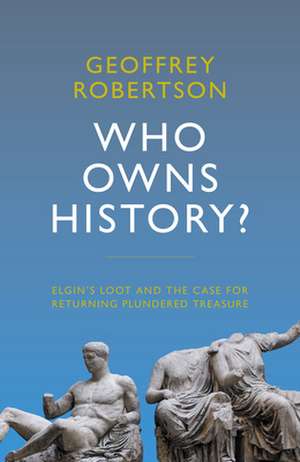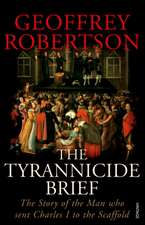Who Owns History?
Autor Geoffrey Robertsonen Limba Engleză Hardback – 5 noi 2019
The controversy rages on over the Elgin Marbles, and has been given immediacy by figures such as France's President Macron, who says he will order French museums to return hundreds of artworks acquired by force or fraud in Africa, and by British opposition leader Jeremy Corbyn, who has pledged that a Labour government would return the Elgin Marbles to Greece. Elsewhere, there is a debate in Belgium about whether the Africa Museum, newly opened with 120,000 items acquired mainly by armed forces in the Congo, should close.
Although there is an international convention dated 1970 that deals with the restoration of artefacts stolen since that time, there is no agreement on the rules of law or ethics which should govern the fate of objects forcefully or lawlessly acquired in previous centuries.
Who Owns History? delves into the crucial debate over the Elgin Marbles, but also offers a system for the return of cultural property based on human rights law principles that are being developed by the courts. It is not a legal text, but rather an examination of how the past can be experienced by everyone, as well as by the people of the country of origin.
Preț: 128.07 lei
Nou
Puncte Express: 192
Preț estimativ în valută:
24.51€ • 25.49$ • 20.23£
24.51€ • 25.49$ • 20.23£
Carte disponibilă
Livrare economică 22 martie-05 aprilie
Livrare express 11-15 martie pentru 31.60 lei
Preluare comenzi: 021 569.72.76
Specificații
ISBN-13: 9781785905216
ISBN-10: 178590521X
Pagini: 320
Dimensiuni: 163 x 243 x 30 mm
Greutate: 0.53 kg
Editura: BITEBACK PUBLISHING
ISBN-10: 178590521X
Pagini: 320
Dimensiuni: 163 x 243 x 30 mm
Greutate: 0.53 kg
Editura: BITEBACK PUBLISHING
Notă biografică
Geoffrey Robertson QC is founder and head of Doughty Street Chambers, the UK's leading human rights legal practice. In 2011, he received the Award for Distinction in International Law and Affairs from the New York State Bar Association.
Descriere
Who Owns History? delves into the crucial debate over the Elgin Marbles, but also offers a system for the return of cultural property based on human rights law principles that are being developed by the courts.
















